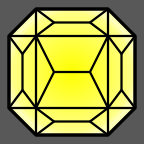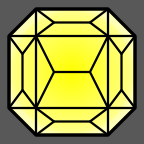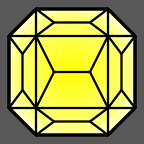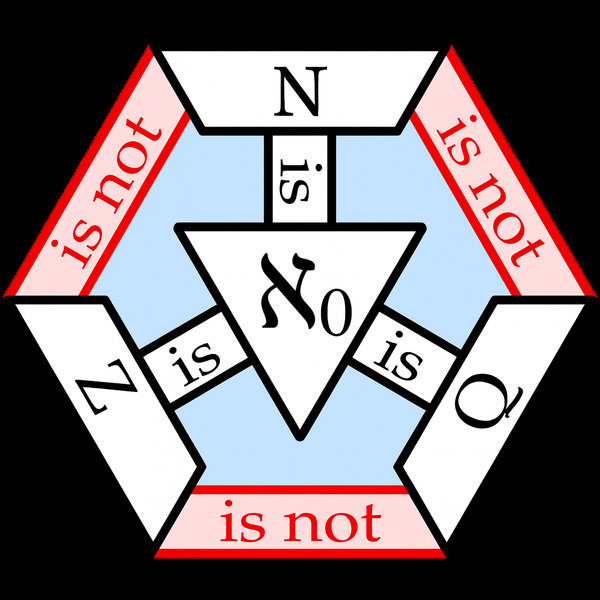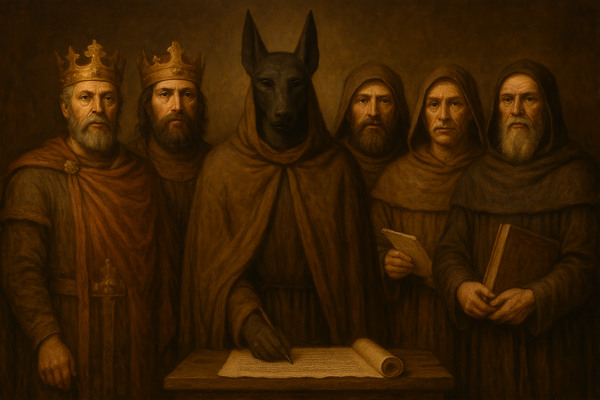Inquiries of Our Reality - Nephilim According to Church Fathers
There are two first century Jewish writings and several writings from early church fathers that addressed the Nephilim and how they understood the Genesis 6 narrative.

In this third episode on the Inquiries of Our Reality Podcast, I presented two first century Jewish writings and several writings from early church fathers that addressed the Nephilim and how they understood the Genesis 6 narrative. These writings collaboratively address how the Nephilim were diverse monstrous creatures that became demonic spirits that pagans worship as gods. While a few of them are well known, several of them don't appear commonly when addressing this topic, discussed what each of them said, what it means, and why it matters.
In the extended episode, we engaged in a rabbit-trailing dialogue about the Nephilim and cryptids in general, how to approach the topic academically, and claims we commonly hear. We also discussed an ancient Greek argument for a singular creator and what I refer to as the Trinity Equation (article soon to come on this topic), which is a mathematical model for understanding the uniqueness, oneness, and infinite nature of the Trinity.
First Century Jewish Scholars
Josephus, Antiquities of the Jews, Book 1, Chapter 3 (1st century AD)
NOW this posterity of Seth continued to esteem God as the Lord of the universe, and to have an entire regard to virtue, for seven generations; but in process of time they were perverted, and forsook the practices of their forefathers; and did neither pay those honors to God which were appointed them, nor had they any concern to do justice towards men. But for what degree of zeal they had formerly shown for virtue, they now showed by their actions a double degree of wickedness, whereby they made God to be their enemy. For many angels of God accompanied with women, and begat sons that proved unjust, and despisers of all that was good, on account of the confidence they had in their own strength; for the tradition is, that these men did what resembled the acts of those whom the Grecians call giants.
Antiquities of the Jews by Josephus 5.2.3 (1st century AD)
There were till then left the race of giants, who had bodies so large, and countenances so entirely different from other men, that they were surprising to the sight, and terrible to the hearing.
Philo, On the Giants, Chapter 2 (1st century AD)
"And when the angels of God saw the daughters of men that they were beautiful, they took unto themselves wives of all of them whom they Chose." Those beings, whom other philosophers call demons, Moses usually calls angels; and they are souls hovering in the air.

Early Church Fathers
Justin Martyr, 2 Apologies, Chapter 5 (2nd century AD)
CHAPTER V -- HOW THE ANGELS TRANSGRESSED.
But if this idea take possession of some one that if we acknowledge God as our helper, we should not, as we say, be oppressed and persecuted by the wicked; this, too, I will solve. God, when He had made the whole world, and subjected things earthly to man, and arranged the heavenly elements for the increase of fruits and rotation of the seasons, and appointed this divine law--for these things also He evidently made for man--committed the care of men and of all things under heaven to angels whom He appointed over them. But the angels transgressed this appointment. and were captivated by love of women, and begat children who are those that are called demons; and besides, they afterwards subdued the human race to themselves, partly by magical writings, and partly by fears and the punishments they occasioned, and partly by teaching them to offer sacrifices, and incense, and libations, of which things they stood in need after they were enslaved by lustful passions; and among men they sowed murders, wars, adulteries, intemperate deeds, and all wickedness. Whence also the poets and mythologists, not knowing that it was the angels and those demons who had been begotten by them that did these things to men, and women, and cities, and nations, which they related, ascribed them to god himself, and to those who were accounted to be his very offspring, and to the offspring of those who were called his brothers, Neptune and Pluto, and to the children again of these their offspring. For whatever name each of the angels had given to himself and his children, by that name they called them.

Irenaeus, Demonstration of the Apostolic Preaching, Section 18 (2nd century AD)
And for a very long while wickedness extended and spread, and reached and laid hold upon the whole race of mankind, until a very small seed of righteousness remained among them and illicit unions took place upon the earth, since angels were united with the daughters of the race of mankind; and they bore to them sons who for their exceeding greatness were called giants.
Tertullian, On the Veiling of Virgins, Chapter 7 (2-3rd century AD)
For if (it is) on account of the angels— those, to wit, whom we read of as having fallen from God and heaven on account of concupiscence after females— who can presume that it was bodies already defiled, and relics of human lust, which such angels yearned after, so as not rather to have been inflamed for virgins, whose bloom pleads an excuse for human lust likewise? For thus does Scripture withal suggest: “And it came to pass,” it says, “when men had begun to grow more numerous upon the earth, there were withal daughters born them; but the sons of God, having descried the daughters of men, that they were fair, took to themselves wives of all whom they elected.”

Commodianus, Instructions, Chapter 3 (3rd century AD)
When Almighty God, to beautify the nature of the world, willed that that earth should be visited by angels, when they were sent down they despised His laws. Such was the beauty of women, that it turned them aside; so that, being contaminated, they could not return to heaven. Rebels from God, they uttered words against Him. Then the Highest uttered His judgment against them; and from their seed giants are said to have been born. By them arts were made known in the earth, and they taught the dyeing of wool, and everything which is done; and to them, when they died, men erected images. But the Almighty, because they were of an evil seed, did not approve that, when dead, they should be brought back from death. Whence wandering they now subvert many bodies, and it is such as these especially that ye this day worship and pray to as gods.
Lactantius, Divine Institutes, Book 2, Chapter 15 (4th century AD)
When, therefore, the number of men had begun to increase, God in His forethought, lest the devil, to whom from the beginning He had given power over the earth, should by his subtlety either corrupt or destroy men, as he had done at first, sent angels for the protection and improvement of the human race; and inasmuch as He had given these a free will, He enjoined them above all things not to defile themselves with contamination from the earth, and thus lose the dignity of their heavenly nature. He plainly prohibited them from doing that which He knew that they would do, that they might entertain no hope of pardon. Therefore, while they abode among men, that most deceitful ruler of the earth, by his very association, gradually enticed them to vices, and polluted them by intercourse with women. Then, not being admitted into heaven on account of the sins into which they had plunged themselves, they fell to the earth.

Sulpicius Severus, Chronicorum, Book 1, Chapter 2 (4th century AD)
When by this time the human race had increased to a great multitude, certain angels, whose habitation was in heaven, were captivated by the appearance of some beautiful virgins, and cherished illicit desires after them, so much so, that falling beneath their own proper nature and origin, they left the higher regions of which they were inhabitants, and allied themselves in earthly marriages. These angels gradually spreading wicked habits, corrupted the human family, and from their alliance giants are said to have sprung, for the mixture with them of beings of a different nature, as a matter of course, gave birth to monsters.
.5 (Extended Episode)
God as an infinite being and creator of all, according to Timaeus via Plato
Plato, Timaeus, Critias, Cleitophon, Menexenus, Epistles: English Text, ed. G. P. Goold, trans. R. G. Bury, The Loeb Classical Library (Cambridge, MA; London, England: Harvard University Press, 1929), 49–51.
Now first of all we must, in my judgement, make the following distinction. What is that which is Existent always [28] and has no Becoming? And what is that which is Becoming always and never is Existent? Now the one of these is apprehensible by thought with the aid of reasoning, since it is ever uniformly existent; whereas the other is an object of opinion with the aid of unreasoning sensation, since it becomes and perishes and is never really existent. Again, everything which becomes must of necessity become owing to some Cause; for without a cause it is impossible for anything to attain becoming. But when the artificer of any object, in forming its shape and quality, keeps his gaze fixed on that which is uniform, using a model of this kind, that object, executed in this way, must of necessity [B] be beautiful; but whenever he gazes at that which has come into existence and uses a created model, the object thus executed is not beautiful. Now the whole Heaven, or Cosmos, or if there is any other name which it specially prefers, by that let us call it,—so, be its name what it may, we must first investigate concerning it that primary question which has to be investigated at the outset in every case,—namely, whether it has existed always, having no beginning of generation, or whether it has come into existence, having begun from some beginning. It has come into existence; for it is visible and tangible and possessed of a body; and all such things are sensible, [C] and things sensible, being apprehensible by opinion with the aid of sensation, come into existence, as we saw, and are generated. And that which has come into existence must necessarily, as we say, have come into existence by reason of some Cause.
The Trinity Equation
In mathematics, a singular infinity can consist of 3 forms of infinity at once. This makes for one of the most deep and complex analogies for the Trinity, and I’ve never heard anyone point it out.
- According to ZFC set theory, N + Z + Q = ℵ0
- This equation describes a single infinite set of numbers that is technically 3 unique and overlapping infinite sets of numbers. It is three in one, where all are infinite. This is not partialism because ℵ0 is a singular infinite set and N, Z, and Q overlap in ways that don’t allow for simply referring to each as a third of the ℵ0.
- Not all unique infinite sets of numbers can coexist in a single infinite set of numbers. They must share what is referred to as cardinality. The infinite set of irrational numbers, for example, could not be included in ℵ0 because it has a different cardinality. This is a fascinating analogy for the Trinity. The Father, Son, and Holy Spirit can all be one because they share cardinality, they are of the same type or essence, they are one (Deuteronomy 6:4).
- THEO. Natural, rational, and integer numbers all have different roles to play in mathematics. These infinite sets contain different numbers, some shared and others unique to themselves. Thus, like the Trinity, their roles are different but also overlap with one another.
- Humanity: Both God and the Holy Spirit cannot die and are not human, so they could not pay the cost of sin for humanity.
- Jesus is fully human (John 1:14, Philippians 2:7) and fully God (Colossians 2:9), which allows Him to be sinless and yet die as a human, paying the cost on our behalf (2 Corinthians 5:21, 1 Peter 2:22).
- Temptation: God the Father cannot be tempted (James 1:13), but Jesus was tempted (Mark 1:13).
- Knowledge: God knows all things (1 John 3:20), while Jesus and the Holy Spirit know only slightly less (Matthew 24:36).
- Humanity: Both God and the Holy Spirit cannot die and are not human, so they could not pay the cost of sin for humanity.



